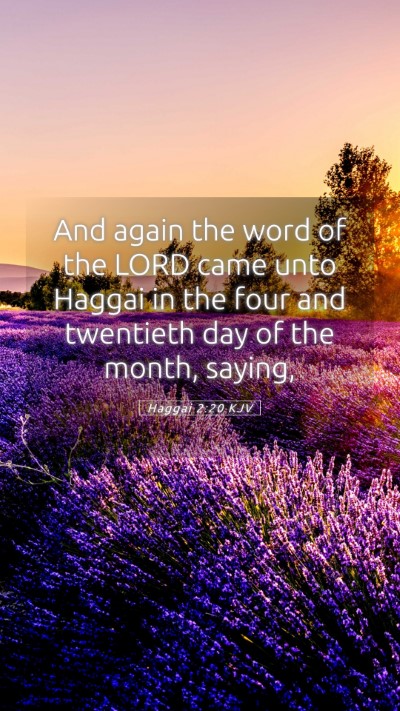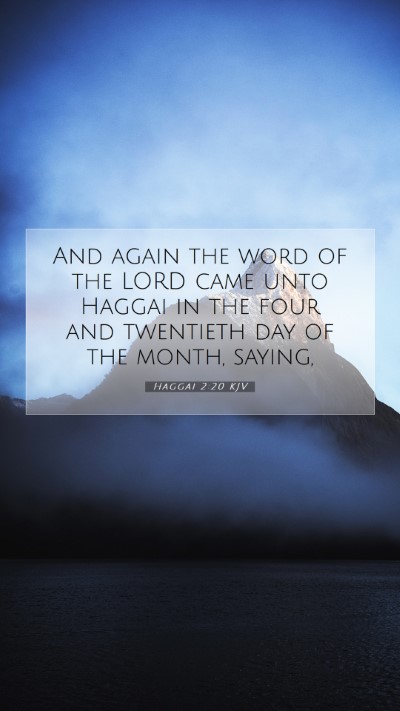Old Testament
Genesis Exodus Leviticus Numbers Deuteronomy Joshua Judges Ruth 1 Samuel 2 Samuel 1 Kings 2 Kings 1 Chronicles 2 Chronicles Ezra Nehemiah Esther Job Psalms Proverbs Ecclesiastes Song of Solomon Isaiah Jeremiah Lamentations Ezekiel Daniel Hosea Joel Amos Obadiah Jonah Micah Nahum Habakkuk Zephaniah Haggai Zechariah MalachiHaggai 2:20 Meaning
What is the meaning of Haggai 2:20?
And again the word of the LORD came unto Haggai in the four and twentieth day of the month, saying,
Haggai 2:20 Bible Verse Meaning
Bible Verse Meaning and Commentary: Haggai 2:20
Haggai 2:20 states, "And again the word of the LORD came unto Haggai in the four and twentieth day of the month, saying," This verse marks a moment of reiteration and emphasis from the Lord to the prophet Haggai, fundamentally guiding us in how to interpret and understand the message being delivered.
Summary of Biblical Context
The book of Haggai is a short yet significant part of the Old Testament, occurring after the Babylonian exile when the Israelites were returning to Jerusalem. They faced challenges in rebuilding the temple, and God uses Haggai to motivate them and remind them of His presence and promises. The context of Haggai's message reveals a call to spiritual renewal and physical restoration of worship.
Insights from Public Domain Commentaries
-
Matthew Henry:
Matthew Henry emphasizes the importance of God's assurance through repeat revelations to Haggai. He suggests that the Lord’s reaffirmation serves as a reminder of His continuous involvement in the lives of His people, showcasing that God is not distant but actively engaged in guiding them in troubling times.
-
Albert Barnes:
Albert Barnes provides an analysis of Haggai's prophetic role, pointing out that this verse signifies divine communication during a crucial time. He highlights that God’s words often come repetitively to reinforce messages that are vital for His people to heed, especially in moments of uncertainty or reluctance, encouraging a deeper understanding of God's intentions.
-
Adam Clarke:
Adam Clarke elucidates the prophetic timing indicated in the chapter, suggesting that God’s messages are given in precise contexts to address specific issues amongst His followers. Clarke notes that the mention of the 'four and twentieth day' holds significance, as it may point to a period of frustration or decline in spiritual fervor that requires prompting from God to renew hope and vision.
Key Themes and Exegesis
This verse serves as a poignant reminder of:
- Divine Communication: The repeated message underscores the importance of listening to God, reinforcing that His words are crucial for navigation through challenging times.
- Encouragement for the People: God reassures His people through the prophet, invigorating them to rise from discouragement and rebuild their spiritual and physical realities.
- Promise and Presence: The Lord’s commitment to the Israelite people is highlighted, showcasing His faithfulness throughout adversities which remains relevant to believers today.
Bible Verse Interpretations
Understanding Haggai 2:20 can provide profound insights for Bible study groups and personal studies alike. It highlights the importance of continual communication with God and a reminder for believers to remain steadfast in their faith despite external challenges. This verse connects to broader themes in Scripture about reliance on God’s word and his active role in the restoration of His people.
Application to Daily Life
In a practical sense, applying the lessons from Haggai 2:20 can manifest through:
- Challenging oneself to engage in regular Bible study lessons that encompass various aspects of scripture analysis.
- Remaining open to God’s guidance in times of personal or communal hardship.
- Utilizing prayer as a tool to invite God’s presence into everyday decisions and challenges.
Related Bible Cross References
- Zechariah 4:6 - Emphasizing not by might nor by power but by God's Spirit.
- Isaiah 41:10 - Assurance of God’s presence in fear and discouragement.
- Haggai 1:13 - The Lord's acknowledgement of Haggai as His messenger.
Conclusion
In summary, Haggai 2:20 is not merely a historical entry but a vibrant promise and directive applicable to believers today. It stands as a testament to the importance of recognizing God’s unwavering communication and encouragement in our journey of faith. Engaging deeply with this verse offers profound Bible verse meanings, facilitates deeper Bible verse interpretations, and enriches our overall understanding of Scripture.


